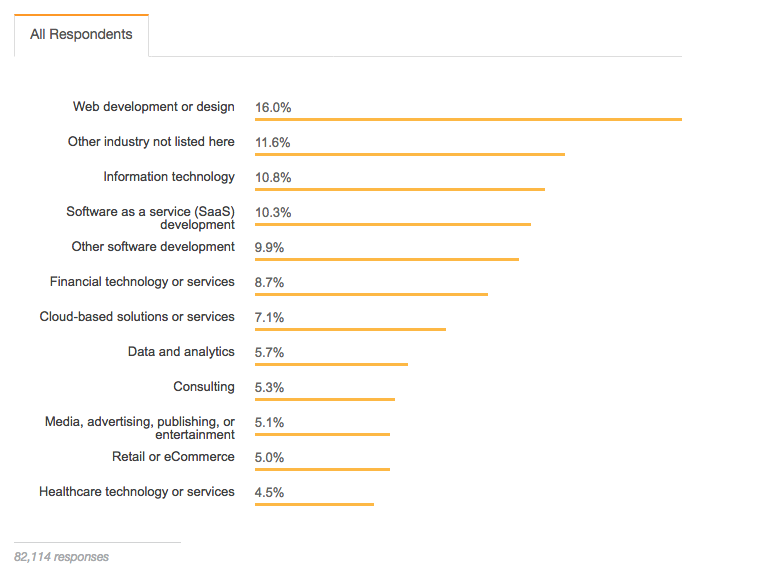People like to draw differences between the culture in tech and finance companies when it comes to hiring software engineers. Today, the work environment in the financial sector for software engineers is more or less the same as for software engineers in other sectors.
Software Engineers in the Financial World
When software engineers get employment opportunities in financial institutions, they need to understand what they are getting themselves into. They still have a software job and not a finance job. This means that their responsibilities encompass analyzing, predicting and developing software solutions based on the tons of financial data at their disposal. Since the business dynamics at financial institutions such as banks are high, there's high pressure on software engineers. A company may lose millions of dollars if the software gurus make a single mistake with a transaction.

Over 101,000 developers responded to this survey—and over 8% of respondents are working in the “Financial technology or services” industry.
To understand the responsibilities of software engineers in financial corporations, it is important to understand how these corporations operate. It is also good to know the type of challenges that the corporations face and how software engineers can solve them. Here are some of these concerns and responsibilities for the software developers.
Demand for High Performance, Scalable and Responsive Systems
Just like any other company, financial institutions need certain systems to operate well. Only software engineers have the ability to ensure that these systems are scalable, and responsive under a high load. These systems can help attract more financial opportunities or help the best insurance companies dominate their sector.
Information Security
Cases of system breaches or credit card theft are rampant in finance. Software developers need to lend a hand to institutions such as banks to prevent any information security threats. Their task will entail developing programs that can combat threats.
Broad Mix of Technologies
Besides working on strict deadlines, software developers in the financial world also have to work with different types of technologies. Their mandate is to use these technologies in designing, developing and deploying effective software solutions. With time, they need to learn how to integrate different technologies into their work.
The Good Side of Software Development in Finance
Software engineers employed in financial companies can carry out their activities from the front or back office. Those who work in the front office and accomplish tasks such as coding trading strategies are likely to earn high salaries. Note that financial companies are of different types. Buy-side firms and hedge funds are known to pay software developers higher than banks. However, the income earned by the developers depends on their background and experience levels. Manual revenue management will certainly make it difficult for companies to manage their business properly. You can use accounting software to facilitate effective and efficient revenue management.
It's easier to move from working in a tech company to working in a financial firm than the other way around. Financial firms have a tendency of attracting software engineers. They also tend to only hire the best and brightest. These firms understand that a simple programming or code error may cause them millions of cash or even make them bankrupt. Along these lines, they only want the best engineers.
The work culture at financial companies is favorable to software engineers. The programing experts get to enjoy salary bonuses and appraisals after about two years depending on the company that hired them. They also carry out their tasks in workplaces equipped with all the resources they need. In their day-to-day tasks, they work on machine learning, high-performance systems, data mining, web security, mobile apps and huge chunks of data.
The Bad Side
As much as the financial sector promises software developers greener pastures, there are some downsides to this sector. Most practitioners in the sector like to think of software development as an easy task. They ignore the fact that it takes many days to think about, design, develop and deploy a software solution. They expect the programmers to come up with such a solution in a small timeframe. They also expect the program to be free of bugs or deployment issues.
Some supervisors assigned to software engineers in financial institutions are impatient. They also have unrealistic expectations regarding how a programmer should carry out his or her job. It is a frustrating experience to work with someone who doesn't understand how you carry out certain tasks. It is also a daunting experience to spend hours or days while trying to fix a bug with little help on your side. There are financial companies that gained negative publicity because of their tendency of killing the careers of programmers.
Financial firms promise software engineers good job security when hiring them. However, they fail to keep the promise as time passes. Cases regarding wrongful employment termination on programmers are always on the rise. These firms are quick to fire the programmers without any notice. It is unrealistic to give experts a few days to complete tasks that take months or years and then fire them when they fail to meet the deadline.
.jpeg?width=650&name=blog-fin-dev-int2-1%20(1).jpeg)
Worldwide banks' priorities according to EY research
Final Thoughts
The only concern that CEOs, CFOs or CTOs of financial companies have regarding the work of software engineers entails how their companies will generate money from the work. They also want to know how the developed software solutions will help to position them on top of their competitors. As software developers begin working for these companies, their mission is to address these concerns. They need to set up accounts quicker, speed up audits, cause fewer errors and make trades go faster through their software solutions.








